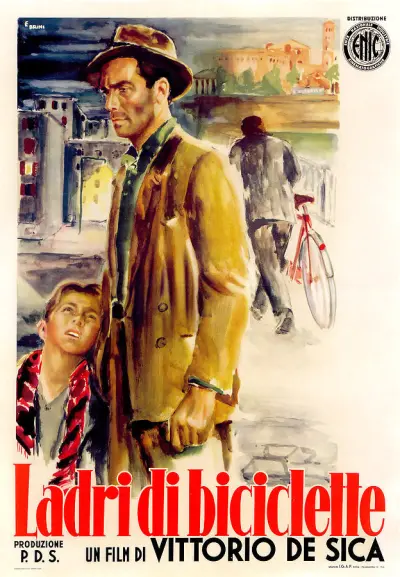
"Ladri di biciclette," translated into English as "Bicycle Thieves," is a deeply affecting film by the esteemed director Vittorio De Sica, a pivotal figure in the Italian Neorealism movement. Set against the backdrop of post-World War II Rome, the film intricately portrays the struggles of Antonio Ricci, a man desperately seeking employment to support his family in an economy ravaged by war. The narrative gains momentum when Ricci, upon securing a job dependent on a bicycle, falls victim to theft, which places his job and family's welfare in jeopardy.
The storyline, though straightforward, is immensely powerful. Ricci's wife Maria sacrifices their household linens, a symbol of their meager wealth, to redeem their pawned bicycle, vital for Ricci's new job. Yet, the bicycle is stolen on his very first day of work. This incident propels Ricci and his son Bruno into a frantic search through Rome. Their journey, marked by encounters in bustling markets and confrontations with the thief, is fraught with desperation. Ultimately, their endeavors are futile; the police provide no assistance, and Ricci, in a moment of despair, attempts bicycle theft himself. This act, witnessed by his son, culminates in public humiliation, but he is spared from legal action due to the compassion of the bicycle's owner.
"Bicycle Thieves" delves deeply into themes of desperation and moral ambiguity in the face of poverty. Antonio Ricci's story transcends the mere loss of a bicycle; it mirrors the broader societal challenges of the era. The film vividly depicts post-war Italian society, plagued by unemployment, poverty, and despair, all of which are encapsulated in Ricci's struggle to maintain his dignity while providing for his family.
As a hallmark of Italian Neorealism, "Bicycle Thieves" is renowned for its authentic portrayal of everyday life, achieved through the use of non-professional actors like Lamberto Maggiorani (a factory worker) in the role of Ricci, and the filming of scenes on location. This approach fosters a profound connection between the audience and Ricci's plight, effectively blurring the lines between fiction and reality.
The film's original title, "Ladri di biciclette," meaning "thieves of bicycles," highlights the rampant culture of theft and the disintegration of social order in post-war Italy. It reflects a society where survival often forces moral compromises, and where law and order are seemingly powerless.
In conclusion, "Bicycle Thieves" is much more than a narrative about a stolen bicycle; it is a potent commentary on human resilience in the face of societal collapse. The film offers a glimpse into the lives of ordinary people grappling with the severe realities of post-war Italy, characterized by economic hardship and ethical complexity. The film's enduring legacy is its stark portrayal of these themes, establishing it as a timeless masterpiece in global cinema.

